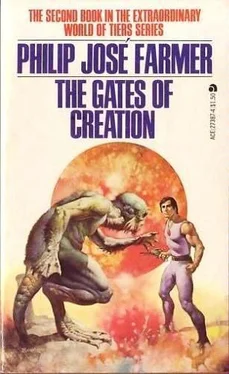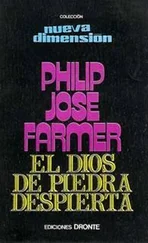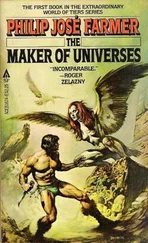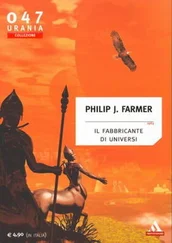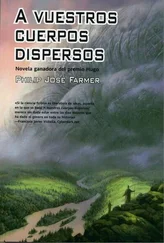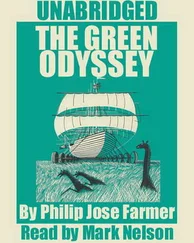“You must have noticed how close the horizon is. This planet has a diameter of about 2170 miles.” (About the size of Earth’s moon, Wolff thought.) “Yet the gravity is only a little less than that of our home-planet.” (Not much stronger than Earth’s, Wolff thought.)
“The gravity fades off abruptly above the atmosphere,” she said, “and extends weakly through this universe. All the other planets have similar fields.”
Wolff did not wonder at this. The Lords could do things with fields and gravitons that the terrestrials had never dreamed of as yet.
“This planet is entirely covered with water.”
“What about this island?” he said.
“It floats. Its origin is a plant which grows on the bottom of the sea. When it’s half-grown, its bladder starts to fill with gas, produced by a bacterium. It unroots itself and floats to the surface. There it extends roots or filaments, which meet with the filaments of others of its kind. Eventually, there’s a solid mass of such plants. The upper part of the plant dies off, while the lower part continues to grow. The decaying upper part forms a soil. Birds add their excrement to it. They come to new islands from old islands, and bring seeds in their droppings. These produce the fronds you see and the other vegetation.” She pointed at a clump of bamboo-like plants.
He asked, “Where did those rocks come from?”
There were several whitish boulders, with a diameter of about twelve feet, beyond the bamboos.
“The gas bladder plants that form islands are only one of perhaps several thousand species. There’s a type that attaches itself to sea-bottom rocks and that carries the rock to the surface when they’re buoyant enough. The natives bring them in and place them on the islands if they’re not too big. The white ones attract the garzhoo bird for some reason, and the natives kill the garzhoo or domesticate it.”
“What about the drinking water?”
“It’s a fresh-water ocean.”
Wolff, glancing through a break in the wilderness of purplish, yellow-streaked fronds and waist-high berry-burdened bushes, saw a tremendous black arc appear on the horizon. In sixty seconds, it had become a sphere and was climbing above the horizon.
“Our moon,” she said. “Here, things are reversed. There is no sun; the light comes from the sky. So the moon provides night or absence of light. It is a pale sort of night, but better than none.
“Later, you will see the planet of Appirmatzum. It is in the center of this universe, and around it the five secondary planets revolve. You will see them, too, all black and sky-filling like our moon.”
Wolff asked how she knew so much about the structure of Urizen’s world. She answered that Theotormon had given the information, though not willingly. He had learned much while a prisoner of Urizen. He had not wanted to part with the information, since he was a surly and selfish beast. But when his brothers, cousins, and sister had caught him, they had forced him to talk.
“Most of the scars are healed up,” she said. She laughed.
Wolff wondered if Theotormon did not have good reasons after all for wanting to kill them. And he wondered how much of her story of their dealings with him was true. He would have to have a talk with Theotormon some tune, at a safe distance from him, of course.
Vala stopped talking and seized Wolff’s arm. He started to jerk away, thinking that she meant to try some trick. But she was looking upwards with alarm and so was Rintrah.
The fronds, sixty feet high, had hidden the object in the sky. Now he saw a mass at least a quarter-mile wide, fifty feet thick, and almost a mile long floating fifty feet in the air. It was drifting with the wind, which came from an unknown quarter of the compass. In this world without sun, north, south, east, and west meant nothing.
“What is that?” he said.
“An island that floats in the air. Hurry. We have to get to the village before the attack starts.”
Wolff set off after the others. From time to tune, he looked up through the fronds at the aeronesus. It was descending rather swiftly at the opposite end of the island. He caught up with Vala and asked her how the floater could be navigated. She replied that its inhabitants used valves in the giant bladders to release their hydrogen. This procedure required almost all the natives, since each bladder-valve was operated by hand. During a descent, they would all be occupied with the navigation.
“How do they steer it?”
“The bladders have vents. When the abutal want the island to go in one direction, they release gas from banks of bladders on the side opposite to that in which they want to go. They don’t get much power thrust, but they’re very skillful. Even so, they have to contend with the winds and don’t always maneuver effectively. We’ve been attacked twice before by the abutal, and both times they missed our island. They’ll drop sea-anchors—big stones on the ends of cables—to slow them down. The first attackers settled down close to our island instead of just above it and had to content themselves with an attack by sea. They failed.”
She stopped, then said, “Oh, no! These must be the Ilmawir. Los help us.”
At first, Wolff thought that the fifty craft that had launched from the floater were small airplanes. Then, as they circled to land against the wind, he saw that they were gliders. The wings, fifty feet long, were of some pale shimmering stuff and scalloped on the edges. A painted image of an eye with crossed swords above it was on the underside of each wing. The fuselage was an uncovered framework, and its structure and the rudder and ailerons were painted scarlet. The pilot sat in a wickerwork basket just forward of the monowings. The nose of the craft was rounded and had a long horn projecting to a length of about twenty feet in front of it. Like the horn of a narwhal, Wolff thought. As he later found out, the horns were taken from a giant fish.
A glider passed above them on a path which would make it land ahead of them. Wolff got a glimpse of the pilot. His red hair stood at least a foot high; the hair shone with some fixative oil. His face was painted like a red Indian’s with red and green circles, and black chevrons ran down his neck and across his shoulders.
“The village is about a half-mile from here,” Vala said. “On the extreme end of the island.”
Wolff wondered why she was so concerned. What did a Lord care what happened to others? She explained that If the Ilmawir made a successful landing, they would kill every human being on the island. They would then plant some of their surplus people as a colony.
The island was not entirely flat. There were rises here and there, formed by the uneven growth of the bladders. Wolff climbed to the top of one and looked over the fronds. The abuta was down to fifty feet now, settling slowly and headed directly for the village. This was a group of about one hundred beehive-shaped huts, built of fronds. A wall twenty feet high surrounded the village. It looked as if it were constructed of stones, bamboo, fronds, and some dull gray poles that could be the bones of colossal sea-creatures.
Men and women were stationed behind the walls and several groups were out in the open. They were armed with spears and bows and arrows.
Beyond the village were docks built of bamboo. Along them and on the shore were boats of various builds and sizes. The floater’s bottom was a dense tangle of thick roots. There were, however, openings in it, and from several of these large stones at the ends of cables of vegetable matter were dropped. The stones were white, gypsum-like, and carved into flat discs. They trailed in the sea as they were dragged along by the island, then struck the land. The cables of some caught under the docks.
Читать дальше
